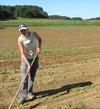I just finished reading Omnivore’s Dilemma by Michael Pollan. I had this book on my list (and bookshelf) for many, many months, but finally committed to reading it when I was actually living on the farm.
The most meaningful part for me was the section when Pollan is visiting Joel Salatin’s “grass farm”, Polyface. This farm is an alternative, post-industrial, post-organic, closed circuit farm. Its production methods are modeled on a consciousness for natural systems in their infinite complexity instead of standardization as seen in industrialized food.
Most compelling to me were Pollan’s comments on economy. There exists a tension between food cost and food price, where production gets streamlined to allow the consumer a lower “at-the-register” price. But the quality is poor and the process incredibly unsustainable.
Alternative food economies are available to consumers who want to, as Joel Salatin says, “opt out” of the industrial model. His farm, like the one on which I work, seeks to develop these alternative economies in order to provide options to consumers. Working through local food systems in farmer’s markets and Community Supported Agriculture, our type of farming feeds people we know who are making food a priority.

And not just food, but creative solutions to economic problems. Right now, as the US stumbles on the cracks of a profit -based economy, consumers can choose to consume in new ways, because those options are now available. The key for farmers is to envision multiple variations to oppose the current standard food model so that consumers can access products in new ways.
Through the generation of alternative markets, through farmer-eater relationships in local settings, the decaying (and some would say, failed) industrial model based upon efficiency, standardization, petroleum, and homogeneity will serve fewer and fewer people. Its folly will be exposed and space for better options will become evident. Much like weeding a bed of broccoli, which I did last month, to take out the suffocating weeds and leave space and resources for the nutritional, marketable, valuable produce to thrive. Yesterday we harvested that same broccoli with ease due to the time we had invested clearing the way for its growth with fewer unnecessary disturbances.
This is a leap of faith, of course. We all hold on so tightly to what we know even if it is not the best option for us, because we are scared of the unknown. Those of us with spiritual leanings live our lives believing in hope and life from a Creator God. It requires some sacrifice, maybe alienation from what we are conditioned to do in our capitalist, show-me society. But we recognize the innate value in living this alternative to mainstream homogeneity, despite the initial hardship or confusion.
Leaving the known is an act of rebellion. Wendell Barry, as referenced by Pollan, believes food is the crucial element in the rebellion against global capitalism. Why? Pollan asks. “Perhaps because food is a powerful metaphor for a great many of the values to which people feel globalization poses a threat, including the distinctiveness of local cultures and identities, the survival of local landscapes, and biodiversity.” 
Local food economies are not a way of ignoring the current reality of globalization, but a way of feeding more people better in light of this reality. For someone who spent the past year working in the heart of globalization at the United Nations, dealing with international policy, and living in the epitome of globalism, New York City, I can say there was nothing more valuable to me than realizing my place in the midst of all the complex diversity I encountered. And I could do this through locally-grown food, which came from people I trusted with philosophies I supported with my own money. If you are what you eat, then I want to be honest, healthy, and innovative.
—————–
Alexandra Buck is a novice apprentice at an organic working farm on the
North Fork of Long Island, New York. She served as Young Adult Intern
at the Presbyterian United Nations Office 2007-2008 before making the
move to get her hands dirty at the farm. She loves beets as big as your
face, heirloom tomatoes, pumpkin patches, and regeneration.